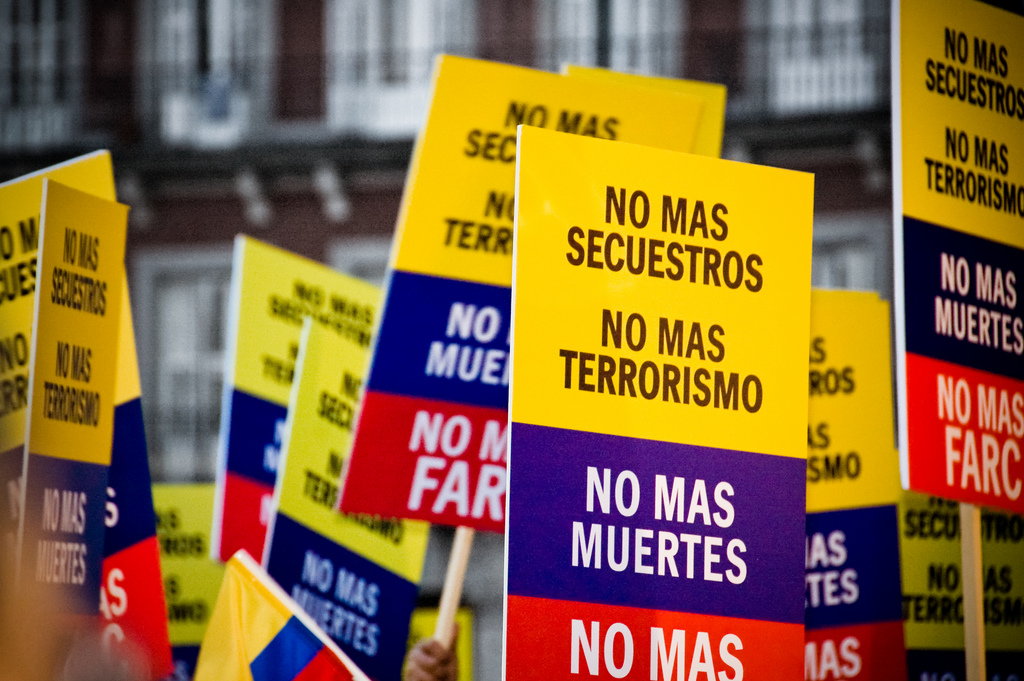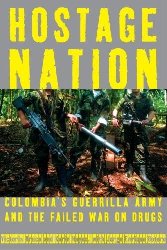
Hostage Nation: Colombia’s Guerrilla Army and the Failed War on Drugs
by Victoria Bruce and Karin Hayes, with Jorge Enrique Botero
—Reviewed by Angilee Shah
 When three American contractors were taken hostage after their plane crashed in the jungles of Colombia in 2003, Victoria Bruce and Karin Hayes were positioned well to tell their stories. The duo had just finished a film about the kidnapped presidential candidate Ingrid Betancourt. But the authors write in the prologue that there was little interest and not much of a market for a book about hostages taken by the Colombian rebel army, the Fuerzas Armadas Revolucionarias de Colombia (FARC).
When three American contractors were taken hostage after their plane crashed in the jungles of Colombia in 2003, Victoria Bruce and Karin Hayes were positioned well to tell their stories. The duo had just finished a film about the kidnapped presidential candidate Ingrid Betancourt. But the authors write in the prologue that there was little interest and not much of a market for a book about hostages taken by the Colombian rebel army, the Fuerzas Armadas Revolucionarias de Colombia (FARC).
The proposal sat on the shelf for years, but the three hostages became an “unshakable part” of the authors’ lives, even though they’d never met. Bruce, Hayes and Colombian journalist Jorge Enrique Botero talked about them on a first-name basis, keeping up with the twists and turns of their ordeal. “What we realized as the years went by was that there was little as journalists or filmmakers that we could do. All three of us attempted to escape the emotional grip of the difficult and consuming subject by taking on new projects, far away from the jungle prison camps.”
By the fall of 2006, however, Bruce, Hayes and Botero began to see the personal dramas that had gripped them for years in a new context. They reformulated their hostage story into a bigger narrative, chronicling “the most wealthy and lethal insurgent army in the world” and the U.S. policies that played a role in creating it. Botero became a central character when he became the only journalist to interview the three American hostages, providing proof that they were still alive five months after their capture.
The authors narrate Hostage Nation from a broad, all-knowing perspective. They disappear into their retelling and shift from one point-of-view to another. They describe the contractors’ plane crash from the vantage of former FBI negotiator. They go deep into the jungle with a low-level FARC soldier who helped run the hostages from one location to the next. The story unfolds piece by piece, revealing intersecting information about drug trafficking, foreign policy, contractor culture, plane safety, the Catholic Church, hostage negotiation and Colombian history.
And they don’t leave the war on drugs out of it. “Plan Colombia,” the U.S. policy conceived during the Clinton administration, expanded in the Bush years, and recently reduced in scale by President Obama, was meant to wipe out guerrilla armies and their cross-border drug trade. It involved heavily contracting and subcontracting military operations. While the U.S. and Colombian governments have declared the policy a success, Hostage Nation says that estimations of declines in cocoa cultivation “could only be interpreted as a twisted analysis of the [U.S.] State Department’s own data.” A State Department report says that cultivation has increased since the three American hostages’ ordeal began, despite the U.S. spending $3 billion in military and nonmilitary aid.
The hostages – Thomas Howes, Keith Stansell and Marc Gonsalves-worked for California Microwave Systems, a subcontractor of Northrop Grumman, which was hired to carry out large chunks of Plan Colombia. When they were taken into the jungle, the U.S. had the benefit of being able to distance itself from private contractors and avoid negotiating, which, in those early post-9/11 years, wouldn’t have sat well with the government. A rescue attempt could have result in the hostages’ murders. When Botero got permission to interview them, the prospects for their release were grim. “As they continued past village after village, each more isolated and impoverished than the last,” the authors write, “Botero felt like a visitor to a war that interested no one.”
The American hostages and Ingrid Betancourt were rescued in 2008; the Colombian army took advantage of an intelligence breach and gave soldiers fake orders to release their high-profile captives. But there are still Colombian hostages left in the jungle and Plan Colombia has not eliminated the FARC or the drug trade. Hostage Nation thus becomes essential reading, an alternate viewpoint, as the fight against drugs is evaluated in Mexico and Afghanistan and around the world.
Further Reading: Out of Captivity: Surviving 1,967 Days in the Colombian Jungle by Marc Gonsalves, Tom Howes, Keith Stansell and Gary Brozek, Imperial Grunts: On the Ground with the American Military, from Mongolia to the Philippines to Iraq and Beyond
by Robert D. Kaplan, Until Death Do Us Part: My Struggle to Reclaim Colombia
by Ingrid Betancourt
Angilee Shah is a freelance journalist who writes about globalization and politics. You can read more of her work at www.angileeshah.com.
*Photo courtesy kozumel.




Send A Letter To the Editors